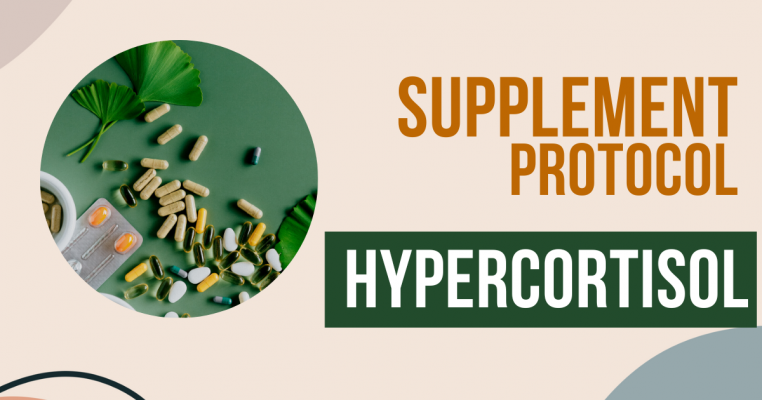“Sluggish thyroid, sluggish everything!” That means if you don’t get your thyroid working, it will be a constant struggle to get everything else in your body working optimally.
Medications may replace insufficient thyroid hormone and try to “prop up” your thyroid. However medications do not work to solve the underlying cause of thyroid dysfunction. A functional medicine approach to thyroid health aims to solve the underlying cause of thyroid dysfunction.
Located just below the center of the neck, the thyroid gland is the body’s internal thermostat. It regulates body temperature by secreting hormones that control how quickly the body burns calories and uses energy for all body functions. The thyroid is responsible for using iodine and protein from our diet to create thyroid hormone (especially T4). Our tissues then convert that T4 into the powerful metabolic hormone T3.
Every cell in the body relies on thyroid hormones for the regulation of their metabolism. If there’s not a lot of gas in the tank, the car won’t go far!
Hypothyroidism
Hypothyroidism (or thyroid under-function) is a common, under-diagnosed, under-treated ailment affecting many millions of people, mostly women. Common symptoms include ongoing fatigue, inability to tolerate cold, easy weight gain, elevated LDL cholesterol, painful PMS, depression, hair loss (on the head), brain fog, poor GI motility (often including constipation), and muscle weakness or low stamina. Low thyroid function can be caused by a wide array of things including poor diet, low iodine, pesticides, ongoing chlorine exposure, fluoride intake, toxins, radiation, or over-consumption of inflammatory, dietary fats.
Hypothyroidism is also often an autoimmune dynamic (sometimes called Hashimoto’s disease or thyroiditis), where the action of the immune system itself is negatively affecting its own thyroid function.
A Functional Medicine Approach to Thyroid Health
In this very detailed post, I’ll be discussing six aspects of thyroid health today:
- How thyroid hormones are produced
- Hypothyroidism and Hashimoto’s
- Why TSH is an insufficient marker of thyroid health and what other labs you need
- The challenges in conversion from T4 to T3
- The steps to get thyroid hormone into our cells
- Supplemental and nutritional support for thyroid health
A Primer to Thyroid Hormone Production
It starts with the hypothalamus as it releases thyrotropin-releasing hormone (TRH). TRH is picked up like a “message” by the pituitary gland. Then thyroid-stimulating hormone (TSH) is released by the pituitary gland. TRH and TSH are hormones made in the brain, not by the thyroid.
Receptors in the thyroid gland bind to TSHwhich causes the production of a protein called thyroglobulin. Thyroglobulin joins with iodine molecules to produce the thyroid hormone T4 (thyroxine).
The majority (about 94 percent) of the hormone made in the thyroid gland is thyroxine (T4); named for its four molecules of iodine. The remaining (6 percent) is triiodothyronine (T3), named for its three molecules of iodine.
T4 and T3 hormones sit on thyroid-binding proteins as they move through the bloodstream, during which they are referred to as “bound.” When they are dropped off at the cells, they are called “free” hormones. Then thyroid hormones must enter the cell to have an impact.
Hypothyroidism and Hashimoto’s Disease
What’s the difference? Regular hypothyroidism is most commonly found in underdeveloped countries that do not have adequate iodine in their food supply. Ninety percent of hypothyroidism in the US and Europe is Hashimoto’s disease, where the body begins attacking healthy thyroid tissue in an exaggerated autoimmunity response.
Hashimoto’s is more than just hypothyroidism. Individuals with Hashimoto’s often have challenges with acid reflux, nutrient deficiencies, anemia, intestinal permeability, food sensitivities, gum disorders, and hypoglycemia in addition to the ‘typical’ hypothyroid symptoms such as weight gain, cold intolerance, hair loss, fatigue, and constipation.
Adapted from Isabella Wentz, PharmD
Laboratory Assessment of Thyroid Health
When we measure thyroid hormones, the three most common markers are:
- TSH (thyroid-stimulating hormone)
- Free T4
- Free T3
While TSH is used by practitioners to assess thyroid levels, free T4 and T3 are more accurate indicators of thyroid function. Understanding TSH, T3, and T4 roles in the body, and in particular why free T3 is so important, makes it easier when trying to understand your thyroid symptoms and labs.
If you’ve been told “your TSH is just fine”, but you feel crappy, listen to your body! The body has to convert T4 to T3 – and unfortunately for many, T4 to T3 conversion does not happen sufficiently. Since TSH is levels are affected by T4, not T3, inadequate conversion of T4 to T3 often isn’t diagnosed because a low T3 level doesn’t affect TSH levels.
So a “perfectly fine” TSH, doesn’t mean you feel “perfectly fine.” TSH is an insufficient marker of thyroid health! Make sure your practitioner is willing to test for Free T3 and T4 along with TSH.
T4 to T3 Conversion
Although the thyroid gland secretes only a little T3, it is the most active form the body can use. T4 must be converted to T3 before the body can use it. Most of this conversion happens in the liver, and also takes place in cells of the heart, muscle, digestive tract, and nerves. About 20 percent of T4 can be converted to T3 by healthy gut bacteria in the digestive tract. Cells convert T4 to T3 with an enzyme called tetraiodothyronine 5’ deiodinase, which removes one molecule of iodine.
In the end, only about 60 percent of T4 is converted into usable T3. Twenty percent converts to Reverse T3 (rT3), an inactive form the body cannot use.
Reverse T3 is considered a storage form of T3 and the body reverses it (causing levels of rT3 to become too high) due to major trauma, depression, dieting, surgery, physiologic stress, or severe chronic illness. In these cases, TSH and T4 levels are no longer accurate measures of tissue thyroid levels. A savvy practitioner will always check Free T3 and calculate a Free T3/Reverse T3 ratio.
Liver and Gut Health are Key to Thyroid Conversion
There are many critical steps in the thyroid process. One important step is the conversion of T4 to T3.
Conversion of T4 to T3 is key for proper thyroid function and all the bodily systems that depend on it. Aside from the thyroid gland, the liver and gut are primary locations for the conversion of T4 to T3 and places where breakdowns in this conversion can occur.
The liver has several channels through which it metabolizes hormones, filters toxins, and cleanses the blood. Byproducts from these processes are dumped into the gallbladder for final removal.
Sluggish thyroid leads to sluggish everything! Low thyroid function bogs down this whole process, making the liver and gallbladder sluggish and congested. Since thyroid hormones are converted into a usable form in the liver, hypothyroidism creates a vicious cycle of hindering liver function so that conversion of T4 to T3 suffers. This is a”what came first” scenario.
When the liver cannot properly break down hormones for elimination, those hormones can go back into the bloodstream in an even more toxic form than when they entered the liver.
Estrogen Dominance and Thyroid Health
Estrogen is one of the hormones that affect thyroid health. Excess estrogen and “strong” estrogen, as well as estrogen which has not been secreted through the bowels negatively affect thyroid health. Elevated estrogen directly affects thyroid function in two ways: (1) estrogen hampers the liver’s conversion of T4 to active T3, and (2) estrogen creates too many thyroid-binding proteins so that thyroid hormones can’t get into the body’s cells.
Estrogen Mimics in the Environment
“Estrogen mimics” are artificial hormones that have a different chemical structure but behave the same as estrogen biologically. Estrogen mimickers are called “xenoestrogens”. Xenoestrogens can be either synthetic or natural chemical compounds. Synthetic xenoestrogens include some widely used industrial compounds, such as PCBs, BPA, and phthalates, which have estrogenic effects on a living organism even though they differ chemically from the estrogenic substances produced internally by the endocrine system of any organism.
Factors such as stress, diet, pharmaceuticals, and environmental toxins (including xenoestrogens) can all disrupt hormonal balance. Sex hormone-binding globulin (SHBG) protects, regulates, and transports sex hormones, estrogen, and testosterone. SHBG is produced primarily in the liver, and binds to the hormones and shuttles them to tissues in the body. When bound to SHBG, estrogen isn’t “free” or available. It’s important for the body to maintain the right amount of available estrogen, relative to the bound estrogen, as well as to the other hormones. Balance and synchronicity are key. An imbalance, along with low SHBG levels, is frequently found in conditions with low thyroid transport.
Hormone Replacement Therapy (HRT)
If estrogen levels are satisfactory, SHBG can act as a marker for tissue levels of T3 (unless a woman is taking oral estrogen hormone replacement therapy). SHBG levels impact estrogen, and estrogen affects the thyroid. Thyroid hormones also affect SHBG levels by increasing its production and often diminishing free estrogen. SHBG levels are expected to increase when thyroid hormone medications are implemented.
T4 to T3 Conversion in the Intestines
The intestines convert about 20 percent of T4 into T3, but only in the presence of enough healthy gut bacteria. We carry approximately four pounds of healthy bacteria in our colons. These bacteria serve many functions, one of which is to facilitate the conversion of T4 to T3. When diets are poor and digestion falters, an overabundance of bad bacteria occurs, crowding out the beneficial bacteria and hampering thyroid conversion.
Antibiotic Use: Something as simple as antibiotic use which knocks out all gut flora, good and bad, can dampen thyroid function.
Dysbiosis: Gastric inflammation from dysbiosis (gut bacteria imbalances) or infection reduces active T3 in another way. Inflammation causes an increase of cortisol, which moves T3 into a Reverse T3 (the storage form.) Cortisol is a hormone made by the adrenal glands.
Stress: Anytime that the body perceives danger, it attempts to preserve T3 in a storage form (rT3), rather than use it for optimal cellular metabolism. Chronic stress is known to hinder thyroid conversion by:
- Affecting communication between the brain and the hormone glands.
- Increasing thyroid binding protein activity, so that thyroid hormones cannot get into cells to do their job.
- Hindering detoxification pathways through which unnecessary thyroid hormones exit the body, leading to thyroid hormone resistance (the inability of cells to receive thyroid hormone).
- Causing cells to lose sensitivity to thyroid hormones.
- Producing excessive cortisol; the body makes plenty of T4, but too much cortisol prevents the body from being able to convert enough T4 to usable T3.
- Inflammation from gut infections, chronic viral infection, Lyme disease, food intolerances, molds, or environmental compounds can disrupt the conversion of T4 to T3. Finding the cause of inflammation and improving antioxidant status are keys to support.
Alzheimer’s and Dementia: Deficiencies in the neurotransmitters serotonin and dopamine hamper conversion of T4 to T3 and slow down the brain’s communication with the thyroid.
Anemia; Anemia is a deal-breaker for thyroid support. Anemia starves your body of oxygen. When your red blood cells are deprived of oxygen, basic functions that maintain, regenerate, and heal the body simply cannot operate adequately, if at all.
The Phenomenon of Hypothyroidism Causing Anemia
Numerous studies have been conducted to explore the connection between hypothyroidism and anemia. Hypothyroidism is known to cause microcytic, normocytic, and macrocytic anemia. Anemia is often one of the first signs that an individual has hypothyroidism (it was for me – and only the anemia was addressed; not the thyroid dysfunction). Both hypothyroidism and anemia are connected to iron levels in the blood, and the rate of anemia in individuals with symptomatic hypothyroidism is approximately double that of the general population.
Nutritional Factors For T4 to T3 Production
Entire books are dedicated to the subject of foods that support healthy thyroid function, so here I will simply mention a few noteworthy nutrients that support T3 and T4 production. They also support healthy thyroid hormone receptor binding and energy-producing metabolism, which is useful during low thyroid function.
These include:
- Essential fatty acids (EPA/DHA). EFAs are found in cold-water fish and contribute nutrients for hormones and also proper cellular communication, brain function, and more.
- Zinc. It has been shown that low zinc status compromises T3 production and zinc supplementation improves thyroid hormone production. These effects may be due to the cofactor role zinc plays with type I 5’ deiodinase. Zinc may also play a role in reducing thyroidal antibodies.
- Copper, magnesium, niacin, riboflavin, pyridoxal-5-phosphate (the active form of Vitamin B6). Make sure you are eating enough of these cofactors in food or via supplementation if you test deficient.
- Vitamin A. Vitamin A is another critical nutrient for thyroid activity. When a thyroid hormone binds to a cell’s receptor site, it sets off a series of biochemical reactions that carry messages to the cell’s nucleus. Vitamin A appears to influence how well the thyroid hormone receptors in the cell’s nucleus function.
- Commiphora Mukul (Guggulu). The guggulsterone compounds in this herb have been shown to stimulate the healthy synthesis of T3 hormones. They also appear to have the ability to balance LDL cholesterol and decrease lipid peroxidation.
- Selenium. Selenium is the major cofactor for the enzyme 5’ deiodinase, which is responsible for converting T4 into T3 as well as degrading rT3 (reverse T3). Studies have confirmed lower production T3 in individuals with lower selenium status.
- Ashwagandha (Withania somnifera). Ashwagandha contains compounds that have been shown to have a stimulatory impact on both T3 and T4 hormone synthesis. Ashwagandha has also demonstrated the ability to modulate the release of harmful cortisol. (As Ashwagandha is in the nightshade family, I am cautious of using Ashwagandha if the thyroid function is autoimmune-based.)
- Phosphatidylserine is a phospholipid (fatty substance) that delivers nutritional compounds to modulate the stress response. PS can be taken in supplement form or obtained through these foods: soy (sprouted and fermented is best), white beans, egg yolks, chicken liver, and beef liver.
There are many factors that come together to either support or break down the body’s ability to properly produce the usable form of thyroid hormone, T3.
Remember that supporting liver function and gut health is key, as well as making sure to address any stress and inflammation that may be hindering conversion.
Nutrition for the Thyroid
Food sensitivities, toxins, microbial imbalances in the gut, intestinal permeability, viral infections, nutrient deficiencies: these may all contribute to triggering this type of autoimmune reaction. Many of those who have hypothyroidism (autoimmune-activated or not) feel better pursuing a diet that reduces intestinal permeability and immune hyper-reactivity. This typically includes 100% elimination of gluten and dairy foods, the most common culprits. Some individuals also benefit from fully eliminating all grains from the diet. Food sensitivity testing may help to highlight some foods that are contributing to inflammation, although it is never 100% comprehensive.
A fully balanced whole foods diet is key for the thyroid, one including vegetables, sea vegetables, nuts/seeds, fruits, and (if it feels good in your body) animal protein and fats. Legumes and gluten-free whole grains may also be nourishing if you digest them well and if they don’t cause you to feel even more sluggish (they are heavy-carbohydrate foods and, as above, may promote inflammation).
Specific foods can contribute to thyroid health when added in moderation to your diet:
- Sea Vegetables. Sea vegetables benefit the thyroid because they contain high concentrations of iodine, as well as supportive iron, phosphorous, potassium, sodium, zinc, magnesium, calcium, copper, chromium, vitamin A, and B vitamins.
- Seafood. Seafood, especially types with a pink color, are also good sources of iodine and healthy fats. In particular, try shrimp, lobster, salmon, halibut, sardines, and crab meat. Choose wild-caught varieties.
- Nuts and Seeds. The thyroid absorbs iodine and combines it with tyrosine (an amino acid) to produce thyroid hormones. Nuts and seeds provide healthy fats and minerals and are also an excellent source of plant-based protein. We also need good “eating hygiene” (ample chewing is key!) and protein digestion (including ample stomach acid) to bring key amino acids into the body to support hormone and neurotransmitter synthesis. I recommend “sprouted” nuts and seeds over raw nuts and seeds.
- Brazil Nuts. Selenium is necessary for T4 to T3 conversion. The soil in some areas of the world (e.g. New England in the US) is particularly deficient in this mineral. Brazil nuts are one of nature’s most potent sources of selenium, so you only need a few per day (very high intake can cause side effects and impair absorption of other minerals). Other sources (though much less potent) include turkey, smoked herring, scallops, chicken, eggs, and walnuts. If you try a selenium supplement, don’t exceed 200 mg/day, and be sure to take it on a full stomach.
- Coconut Oil. Unlike highly refined, cheap vegetable oils that can promote inflammation in the body, coconut oil does not block thyroid hormone secretion. A medium-chain saturated fat, coconut oil is nature’s richest source of MCTs (medium-chain fatty acids) which increases metabolic rate and can help increase energy for those who have insulin resistance or other forms of poor metabolism.
- Protein and Iron. Be sure to get adequate protein from a variety of forms, including fish, chicken, eggs, seafood, cheese, or plain yogurt. If you do well with hardier meats, include beef and organ meats such as liver as well. Choose organic and grass-fed varieties. You need iron to convert T4 hormone to T3; many of those with sluggish thyroid also have low iron (best blood test for this ferritin) which can escalate symptoms over time.
- Vitamin A. You also need sufficient Vitamin A to allow thyroid hormone synthesis. If you are diabetic or have low thyroid function, Vitamin A often must come from animal protein sources to be well absorbed (these individuals often cannot synthesize it effectively from carotenes in vegetables). Natural Vitamin A also comes from cod liver oil and egg yolks.
- Zinc. Zinc is a very common American deficiency! Meats and seafood are wonderful sources of zinc; oysters are the most potent foods source overall. Pumpkin seeds and chickpeas (sprouted chickpea hummus is delicious) are some of the best vegetarian sources for zinc. Individuals with vegan diets often struggle with an imbalance of zinc and copper with insufficient zinc as copper dominates (which imbalance can be one of the root causes of anxiety!)
Foods Which Can Harm the Thyroid
Some common foods are mistakenly regarded as universally “healthy” and can contribute to thyroid dysfunction:
- Processed, packaged convenience foods. Because these are typically depleted of minerals, regular consumption reduces overall body nutrition (empty calories) and can inhibit thyroid function. Be aware of “gluten-free” foods which are often made with unhealthy fillers and ingredients unnecessary for health and nutrition.
- Unfermented, processed soy products. Americans over-consume refined and highly-processed soy products such as soy milk and “fake meat” products marketed to vegetarians. Soy must be fermented to release its natural goitrogens, anti-nutrients that inhibit the body’s ability to use iodine, promote goiter formation, and act like anti-thyroid drugs. Fermented soybean products, a healthy staple in many Asian cultures, including tempeh, miso, natto, shoyu (Japanese-style soy sauce), and tamari (natural soy sauce) can be consumed in small quantities. If you do choose to consume soy products more often, it is particularly key to ensure you have adequate selenium and iodine intake. Surprised? While soy foods share many common ingredients, it is the isoflavones in soy that have been associated with decreased thyroid hormone output. Isoflavones are naturally-occurring substances that belong to the flavonoid family of nutrients.
- Too much raw cruciferous vegetables. These are very healthy foods and should be part of your daily diet. This family of vegetables includes goitrogens which are deactivated with heat (not so with those in processed soy). Foods from these families (e.g. Brassicaceae) contain goitrogenic compounds: broccoli, kale, collard greens, mustard greens, cauliflower, Brussels sprouts, radishes, turnips, bok choy, arugula, daikon, and rutabaga. Small servings of these veggies raw are fine, so don’t be afraid of them. If you have low thyroid function and tend to indulge heavily in these vegetables, good for you; just choose most of them in a cooked form (lightly steamed).
- Fluoride, as found in toothpaste and tap water, chlorine, found in municipal water supplies, pesticides, and numerous household cleaners, and bromine, as found in many pesticides and almost all commercial baked goods and flours (and flour-containing foods). These three all block iodine receptors in the thyroid gland. Many alternative types of toothpaste are available. Many water treatment systems filter out chlorine and fluoride; when buying water outside the home, choose distilled or spring water. Look for unbleached and unbrominated flours.
- Caffeine and Stress. A life fueled by caffeine to make up for lack of rest and sleep often leads to exhaustion of the adrenal gland. Stress hormones secreted by the adrenal gland can block thyroid hormone function and lower your metabolism as a protective mechanism.
We can’t end without talking about the role of stress and the thyroid. Unrelenting stress that causes the body to go into a state of constant “fight or flight” causes cortisol to increase, often depleting the adrenals.Under stressful conditions, TSH may appear to be normal, however conversion from T4 to T3 is impaired as well as movement of T3 into rT3, where T3 is unable to be available to cells and tissues where needed.
Putting Hypothyroidism in Remission
As you can see, resolving hypothyroidism is more than just taking a thyroid supplement. A Functional Medicine approach to thyroid health is about uncovering the triggers and root causes that have lead to insufficient thyroid hormone being produced and/or not being taken into each cell.
Resources and References for this Post
Prescription for Nutritional Healing, by Phyllis A Balch
Nourishing Traditions, by Sally Fallon,
Ultra-Prevention, by Mark Hyman MD and Mark Liponis MD
Factors that Affect Thyroid Production (PDF Download), Courtesy of The Institute for Functional Medicine
The Wellness Journal







